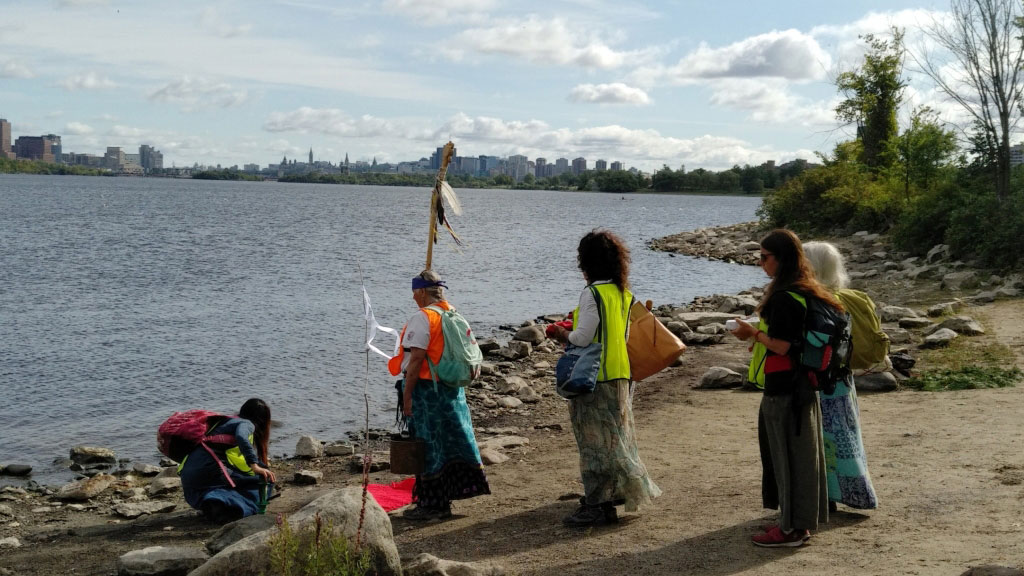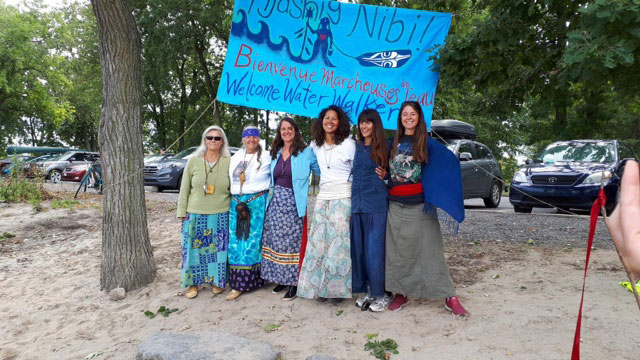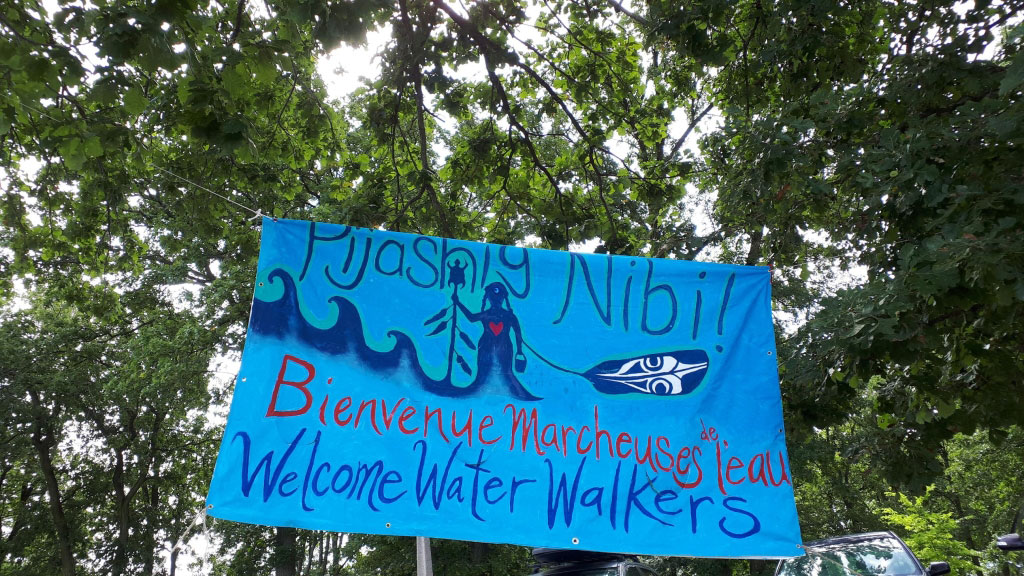CANOE STORIES FESTIVAL WEEK ONE FEATURE: Welcoming the Water Walkers
Emily Rose Michaud is an “interdisciplinary artist and educator working at the crossroads of community organization, ecology and civic participation.” This past Sunday, Emily was also a vital part of organizing the Welcoming event for the Mother Earth Water Walkers. In this post Emily shares her reflections on the event.
From Emily Rose:
Like a drop of water, we have impact within our collective. We can’t afford to be on standby as the war wages on in our own back yards, every single day. This difference we make can emerge in our very embodiment of values that are learned directly through relationship building, meaningful conversations, visits with the water. The difference we can make is carried in the remembrance within our own bone lineage. Fighting to keep the holy, living world intact in a world that too often forgets to remember.
6 water walkers arrived to Bate Island after a 3 week trek from Matane, carrying the big Atlantic salt to converge with the Kitchissippi on Sunday, September 15 for a ceremony and welcoming feast in collaboration with Circadia Indigena for the Canoe Stories Festival. Over 70 people were in attendance to witness the water convergence, sharing, song, drumming, pipe and water ceremonies and teachings. It was an emotional day, both raw and victorious. The walkers were carrying more than water and resource. They were carrying emotion and life itself: sadness, joy, weight, beauty. The strength of the water was spoken through the walkers words. It was powerful to witness this event in each other’s company as much as it was sobering to make grief visible in a public forum. Gatherings and action of this kind are essential to cure fear. Ceremonies such as these renew strength, hope, identity, purpose, truth, reconciliation and love, always through action.
MORE REFLECTIONS ON THE DAY
From Grandmother Francine (Lead Water Walker):
Chimàn (the canoe) is a very important part of the walk as our ancestors used the canoe to travel along the same Waters as the ones we walk. It was an honor to be welcome by all the people in relation with the canoe festival. For the anishinabeg people, the canoe made mobility easy and it was essential for our survival, we were able to move quietly the same way we carry the Water copper vessel along the walk. Walking for water is a walking prayer. In our culture women have a sacred responsibility toward Water; water is not only Sacred but it’s our lifeline. In ceremony such as a water walk, only women carry the water, indicating that women are caretakers of water.
In 1999 an Anishinabe woman from Kitigan Zibi had a dream; the dream was so intense that she asked the help of a few grandmothers to better understand the meaning. It was very clear to the grandmothers that a ceremony had to happen and so it did. The dream was about the “Nibi Wabo Song”, the song of the Water, a very old song; they say that the song was sang by the grandmothers 400 yrs. ago and that the ceremony had not been done in over 150 yrs. We have known for a long time that Water is alive, and in the Anishinabe culture women are responsible for life therefore, responsible for Water. The Water ceremony came back to life in 2002 and we have been doing it ever since on every full Moon and every time women gather together. It is very obvious that the Water needs our attention. Raising awareness about the need to protect water and “Walk our Talk” is one of the purposes of the walks. It is a critical time for our Mother, there has never been more urgency for humanity to make the connection with all of our relations once again and take steps to align ourselves with sustainable ways of thinking, behaving and being.
From April Lilley (Water Walker):
Wow, what a welcoming!
The sound of the drums and voices let us know we were welcomed, appreciated, home. The communities embrace was felt from the moment we stepped onto Bates [sic] Island, a place of ancient ceremony and connection. “All we need is Water, Fire, Song, feast and the people; that’s what makes ceremony and builds community” reminded Grandmother Francine. Not even the drum is necessary, the water ceremony reminds us that we can simply pick up sticks to create music, ceremony.
Those in attendance remembered the richness we inherit from our ancestors, the strength of who we are today, and that we have all that is needed to move forward!
Chi meegwetch to everyone, from every background, who joined in celebration to create this growing, inclusive and ‘wealthy’ community.
Also on Sunday, dancer Olivia C. Davies performed Kichisippi Love ~ an honoring at the start of the feast. Her performance can be viewed here.






